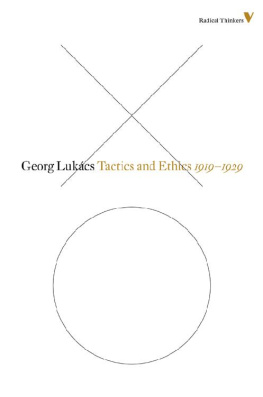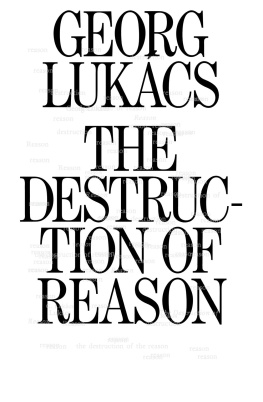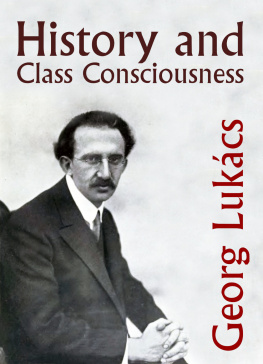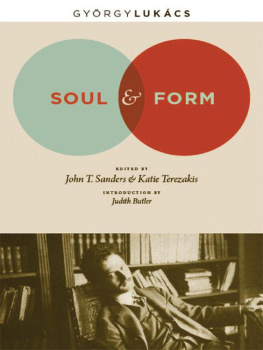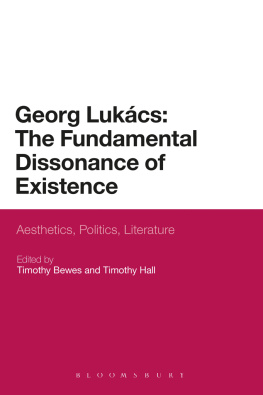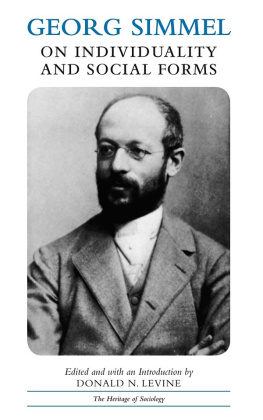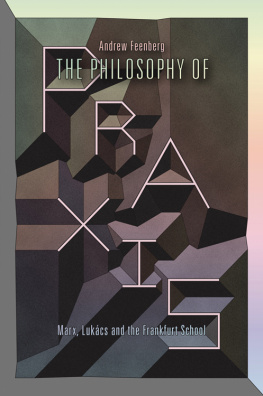Georg Lukacs - Tactics and Ethics: 1919-1929 (Radical Thinkers)
Here you can read online Georg Lukacs - Tactics and Ethics: 1919-1929 (Radical Thinkers) full text of the book (entire story) in english for free. Download pdf and epub, get meaning, cover and reviews about this ebook. year: 2014, publisher: Verso, genre: Politics. Description of the work, (preface) as well as reviews are available. Best literature library LitArk.com created for fans of good reading and offers a wide selection of genres:
Romance novel
Science fiction
Adventure
Detective
Science
History
Home and family
Prose
Art
Politics
Computer
Non-fiction
Religion
Business
Children
Humor
Choose a favorite category and find really read worthwhile books. Enjoy immersion in the world of imagination, feel the emotions of the characters or learn something new for yourself, make an fascinating discovery.
- Book:Tactics and Ethics: 1919-1929 (Radical Thinkers)
- Author:
- Publisher:Verso
- Genre:
- Year:2014
- Rating:5 / 5
- Favourites:Add to favourites
- Your mark:
- 100
- 1
- 2
- 3
- 4
- 5
Tactics and Ethics: 1919-1929 (Radical Thinkers): summary, description and annotation
We offer to read an annotation, description, summary or preface (depends on what the author of the book "Tactics and Ethics: 1919-1929 (Radical Thinkers)" wrote himself). If you haven't found the necessary information about the book — write in the comments, we will try to find it.
Tactics and Ethics: 1919-1929 (Radical Thinkers) — read online for free the complete book (whole text) full work
Below is the text of the book, divided by pages. System saving the place of the last page read, allows you to conveniently read the book "Tactics and Ethics: 1919-1929 (Radical Thinkers)" online for free, without having to search again every time where you left off. Put a bookmark, and you can go to the page where you finished reading at any time.
Font size:
Interval:
Bookmark:

This edition published by Verso 2014
This English-language translation first published by New Left Books 1972
Translation Michael McColgan 1972, 1973, 2014
Introduction Rodney Livingstone 1972
First published as Werke, vol. 2
Hermann Luchterhand Verlag 1968
All rights reserved
The moral rights of the authors have been asserted
Verso
UK: 6 Meard Street, London W1F 0EG
US: 20 Jay Street, Suite 1010, Brooklyn, NY 11201
www.versobooks.com
Verso is the imprint of New Left Books
ISBN-13: 978-1-78168-149-7
eBook ISBN: 978-1-78168-203-6
eISBN (UK): 978-1-78168-512-9
British Library Cataloguing in Publication Data
A catalogue record for this book is available from the British Library
Library of Congress Cataloging-in-Publication Data
A catalog record for this book is available from the Library of Congress
v3.1
For Georg Lukcs the decade 19191929 represents a period of sustained political activity, at first in the Hungarian Soviet Republic of 1919 and subsequently in exile in Vienna. His direct experience of events in the turbulent period of history following the end of the First World War and the Russian Revolution furnished him with abundant material for a series of essays on political subjects. Of these only two, the monograph Lenin and the collection entitled History and Class Consciousness have hitherto appeared in book-form in English. The contents range from the analysis of particular events or trends to the discussion of more general problems of a political nature and the revaluation of earlier figures such as Lassalle or Moses Hess. They doubtless vary in importance, but taken together they can be said to provide a full account of the development of Lukcss thought from the moment of his decision to join the Hungarian Communist Party in December 1918 to the moment when he resolved to give up political activity in the face of the violent criticism provoked by the Blum Theses. Moreover, it should now become possible to site Lenin and History and Class Consciousness in the context of his overall development. A number of the themes developed more fully in the latter work can be found here in embryo and since they often bear on matters of immediate moment they may help to elucidate that important but daunting text.
There is a logic in Lukcss decision to become a Marxist, but there can be no question of a smooth evolution from his earlier position. Even though a number of critics have rightly pointed to the connections between the different phases of his works, the persistence in his maturity of motifs dating from his earliest, pre-Marxist writings, Lukcs himself has always emphasized the changes in his views and has never hesitated to reject lines of thought and even entire books which he regarded as erroneous or superseded. The problem has been compounded by the vexed issue of his various political recantations. But it is important to realize that even if we leave these aside we are still confronted with an oeuvre characterized by discontinuity, rapid changes of position and conflicts resolved only with difficulty. This is particularly true of his intellectual development during the First World War culminating in his commitment to Marxism.
At the outbreak of war Lukcs was living in Germany, as a lecturer in aesthetics at Heidelberg. His career up to that point had been brilliant but not untypical of his generation of the Austro-Hungarian intelligentsia. He was born in 1885 into a wealthy Jewish family in Budapest. His father was a director of the leading bank in Hungary and had been ennobled by the Hapsburgs. Lukcs himself used the honorific von in his publications apparently until 1918. His development was precocious: his first writings appeared in print in 1902, he was a co-founder of the Thalia theatre in 1905 and contributed both to the radical journal Nyugat (The West) and to Oscar Jszis Huszadik Szzad (The Twentieth Century), the organ of the Sociological Society. In 1906 he obtained his doctorate at Budapest University and in 1908 he was awarded a prize for his two-volume Development of the Modern Drama (which appeared in 1911 in Hungarian). In the same year the German version of The Soul and the Forms was published, a collection of literary essays on Stefan George, Novalis, Theodor Storm, Paul Ernst and on the essay form itself. This work established his reputation as a critic and had a significant influence, e.g. on Thomas Manns Death in Venice. In 1909/10 Lukcs went to Berlin and attended the lectures of the philosopher, sociologist and literary critic Georg Simmel. After extensive travels he finally settled in Heidelberg in 1912, where he made the acquaintance of Max Weber and members of the George circle (though there is some doubt whether he actually met George himself), and attended the lectures of the prominent neo-Kantian philosophers Rickert and Windelband. He also became friendly with their most important pupil, Emil Lask, whose ideas exercised an important influence on his own.
Lukcs seems to have had no difficulty in assimilating the culture of Wilhelminian Germany. By contrast, say, with Kafka, in whom the conflicting claims of German, Jewish and Czech cultural identities combined to exacerbate his own sense of estrangement, Lukcs does not seem to have experienced divisive pressures of that kind. The increasing dominance of Hungary within the decaying Hapsburg empire and also the greater homogeneity of the small, almost entirely Jewish, bourgeois intelligentsia may have resulted in a greater cultural confidence. It has been pointed out, moreover, that unlike the Russian revolutionaries who for all their Westernizing retained contact with popular, Narodnik movements, the Hungarian left-wing intellectuals were much more deracinated, urban and Jewish in a predominantly rural, peasant country. Their assimilation to western ideas was thereby made easier and more absolute. At any rate the growth of Lukcss views at this time accurately reflects the movement of thought in Germany and the extreme complexity we find in his position mirrors the crisis towards which German civilization was being propelled.
German intellectual life at this time was characterized by the powerful thrust of the empirical sciences and the positivist philosophy which provided them with a rationale. Whereas in England positivism could be readily synthesized with existing traditions of empiricist and utilitarian thought, in Germany it came into direct collision with idealist traditions which endured, although decadent and under attack (e.g. by Nietzsche). In addition to, and reinforcing, technology and science, there was also the coarse materialism of the age of imperialism, whose cynicism, ruthlessness and chauvinism are documented in the novels of Heinrich Mann and the cartoons of Georg Grosz. Both academic philosophers and creative writers were concerned therefore to produce a counterweight to what they saw as the dehumanizing forces of the modern world, the approach of nihilism proclaimed by Nietzsche. What Lukcs found in Germany was a variety of ripostes to materialism which ranged from the wilder excesses of irrationalism and mysticism to the haughty individualism of the George circle.
The position of neo-Kantianism in the spectrum of thought is particularly revealing for, paradoxically, Kants dualism could be used both to strengthen and to undermine the supremacy of the physical sciences. On the one hand, the Marburg philosophers (Natorp, Cohen, Rudolph Stammler) upheld Kants anti-metaphysical bias, and attempted to limit philosophy to logic and the theory of knowledge, insisting that its function was to provide a rationale for the special sciences. On the other hand, the Heidelberg philosophers, Rickert and Windelband, were much more hostile to positivism and used the Kantian distinction between pure and practical reason to establish the autonomy of the humane sciences. They concentrated above all on history, but it is clear that if they could show the validity of history as an alternative to the natural sciences, the proof would apply to the humane and social sciences in general. In this they were supported by the writings of Dilthey whose major project was to provide an adequate epistemology of the historical sciences, a critique of historical reason to supplement Kant.
Font size:
Interval:
Bookmark:
Similar books «Tactics and Ethics: 1919-1929 (Radical Thinkers)»
Look at similar books to Tactics and Ethics: 1919-1929 (Radical Thinkers). We have selected literature similar in name and meaning in the hope of providing readers with more options to find new, interesting, not yet read works.
Discussion, reviews of the book Tactics and Ethics: 1919-1929 (Radical Thinkers) and just readers' own opinions. Leave your comments, write what you think about the work, its meaning or the main characters. Specify what exactly you liked and what you didn't like, and why you think so.

